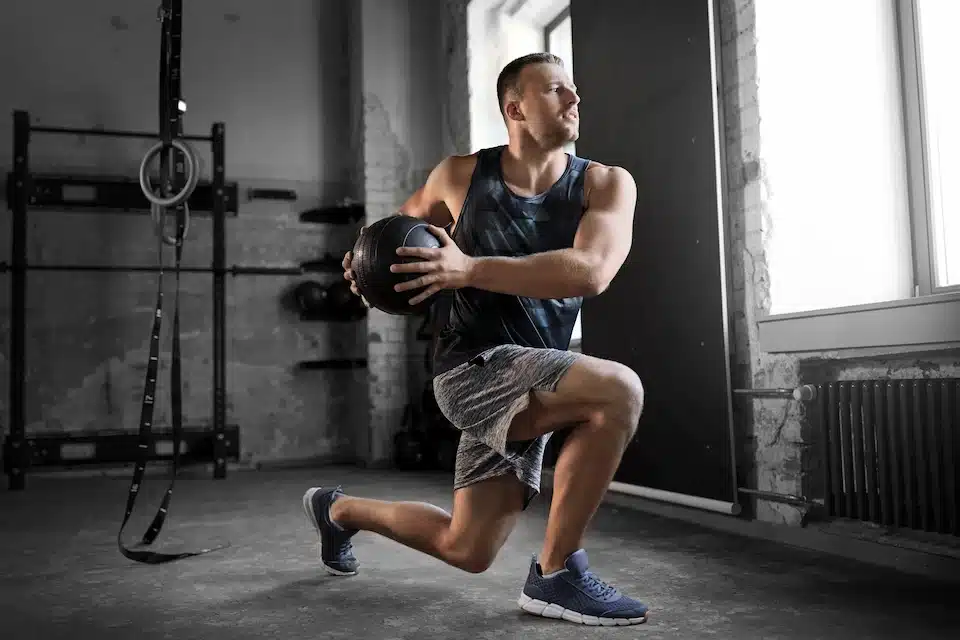At Lifter’s Digest, we know that achieving your fitness goals starts with understanding nutrition and tracking your progress. Our health and nutrition guide & fitness calculators are designed to help you make informed decisions about your diet and exercise routine.
This comprehensive guide will break down the essentials of macronutrients, introduce you to key fitness calculators, and show you how to create a balanced nutrition plan tailored to your unique needs.
Understanding Macronutrients: The Building Blocks of Fitness
Macronutrients form the foundation of our diet and play essential roles in our fitness journey. Understanding these key nutrients will help you optimize your workout performance and overall health.
Protein: The Muscle Builder
Protein stands as a cornerstone for muscle growth and repair. The American College of Sports Medicine recommends a daily intake of 1.2-1.7 grams of protein per kilogram of body weight for individuals who lift weights regularly or are training for running or cycling events. High-quality protein sources include:
- Lean meats
- Fish
- Eggs
- Plant-based options (legumes and tofu)
Carbohydrates: Your Body’s Fuel
Carbohydrates serve as your body’s primary energy source. The Dietary Reference Intakes suggest that adults consume 45% to 65% of their total calories from carbohydrates. For optimal performance, focus on complex carbohydrates such as:
- Whole grains
- Fruits
- Vegetables
These options provide sustained energy and are rich in fiber (which aids digestion and promotes satiety).
Fats: Essential for Health
Contrary to outdated beliefs, fats are vital for hormone production and nutrient absorption. The American Heart Association recommends that 20-35% of your daily calories should come from healthy fats. Incorporate these sources into your diet:
- Avocados
- Nuts
- Seeds
- Olive oil
These fats support brain function and help maintain healthy skin.
Balancing these macronutrients is key to achieving your fitness goals. A macro calculator can determine your ideal macronutrient ratio based on your specific needs and activity level. Consistency in your macronutrient intake, combined with regular exercise, will lead to long-term success in your fitness journey.

Now that we’ve covered the basics of macronutrients, let’s explore how fitness calculators can help you track your progress and fine-tune your nutrition plan.
Essential Fitness Calculators for Tracking Progress
Tracking your fitness journey requires the right tools. We’ve compiled a list of must-use fitness calculators that will help you stay on top of your game.
Body Mass Index (BMI) Calculator
The BMI calculator provides a quick assessment of your body composition. While it doesn’t account for muscle mass, it serves as a good starting point. The Centers for Disease Control and Prevention (CDC) considers a BMI range of 18.5 to 24.9 as healthy. However, BMI is just one metric and should not be used in isolation.
Basal Metabolic Rate (BMR) Calculator
Your BMR represents the number of calories your body burns at rest. This number is key for weight management. The Harris-Benedict equation often calculates BMR. For instance, a 30-year-old man (weighing 80 kg and standing 180 cm tall) would have a BMR of about 1,810 calories per day.
Total Daily Energy Expenditure (TDEE) Calculator
TDEE factors your BMR and activity level to give a more accurate picture of your daily calorie burn. The American Council on Exercise (ACE) emphasizes that knowing your TDEE is vital for creating an effective nutrition plan. If your TDEE is 2,500 calories and you want to lose weight, you might set a daily intake goal of 2,000 calories.
Macro Calculator for Personalized Nutrition
A macro calculator determines the right balance of proteins, carbs, and fats for your goals. The International Society of Sports Nutrition recommends that athletes consume 0.25 g of a high-quality protein per kg of body weight, or an absolute dose of 20–40 g. A good macro calculator takes into account your specific goals, whether it’s building muscle, losing fat, or maintaining your current physique.

These calculators, when used together, provide a comprehensive view of your nutritional needs. It’s important to note that these tools offer estimates, and consulting with a healthcare professional or registered dietitian for personalized advice is always beneficial.
Now that you understand the importance of these fitness calculators, let’s explore how to create a balanced nutrition plan tailored to your unique fitness goals.
How to Build Your Perfect Nutrition Plan
Calculate Your Daily Calorie Needs
The foundation of your nutrition plan starts with determining your daily calorie needs. Use a Total Daily Energy Expenditure (TDEE) calculator to establish your baseline. If your TDEE is 2,500 calories and you want to lose weight, set a daily intake goal of 2,000-2,200 calories. This approach can lead to a sustainable weight loss of 0.5-1 pound per week (according to the National Institutes of Health).
Tailor Your Macronutrient Ratios
After setting your calorie target, break it down into macronutrients. The American College of Sports Medicine recommends these guidelines for active individuals:
- Protein: 1.2-2.0 grams per kilogram of body weight
- Carbohydrates: 3-5 grams per kilogram of body weight
- Fats: 20-35% of total daily calories

Adjust these ratios based on your specific goals and activity level. Endurance athletes might increase their carbohydrate intake, while those focusing on muscle gain might opt for the higher end of the protein range.
Plan Your Meals for Success
Effective meal planning helps you stick to your nutrition goals. Prepare meals in bulk for the week to save time and ensure healthy options are always available. Include a variety of colorful vegetables, lean proteins, and complex carbohydrates in each meal.
A study in the American Journal of Preventive Medicine found that more time spent on food preparation correlates with higher diet quality. Try to dedicate at least an hour per day to food preparation to improve your overall nutrition.
Prioritize Hydration
Proper hydration is essential for optimal performance and recovery. The average daily water intake for men is about 15.5 cups (3.7 liters) and for women about 11.5 cups (2.7 liters). Your needs may vary based on activity level and climate.
A practical tip: weigh yourself before and after workouts. For every pound lost during exercise, drink 16-24 ounces of water to replenish fluids adequately.
Track and Adjust Your Plan
Use nutrition tracking tools (like those available at Lifter’s Digest) to monitor your progress. Regularly assess your results and make adjustments as needed. Your nutrition plan should evolve with your changing fitness goals and lifestyle.
Final Thoughts
Understanding macronutrients, using fitness calculators, and creating a personalized nutrition plan are essential steps towards achieving your wellness goals. These tools provide valuable insights into your body composition, metabolic rate, and daily energy needs. Our health and nutrition guide & fitness calculators help you make informed decisions about your diet and exercise routine.

Lifter’s Digest supports you on your wellness journey with detailed movement guides, tailored workout routines, and expert nutrition insights. We ensure you perform exercises safely and optimize your dietary practices. Your path to wellness is unique, and Lifter’s Digest provides the resources you need to make steady progress towards your fitness goals.
Take the first step today and use our calculators to determine your nutritional needs. Explore our workout routines and expert insights to discover a healthier, stronger version of yourself. Your journey to wellness starts now, and Lifter’s Digest is here to guide you every step of the way.





